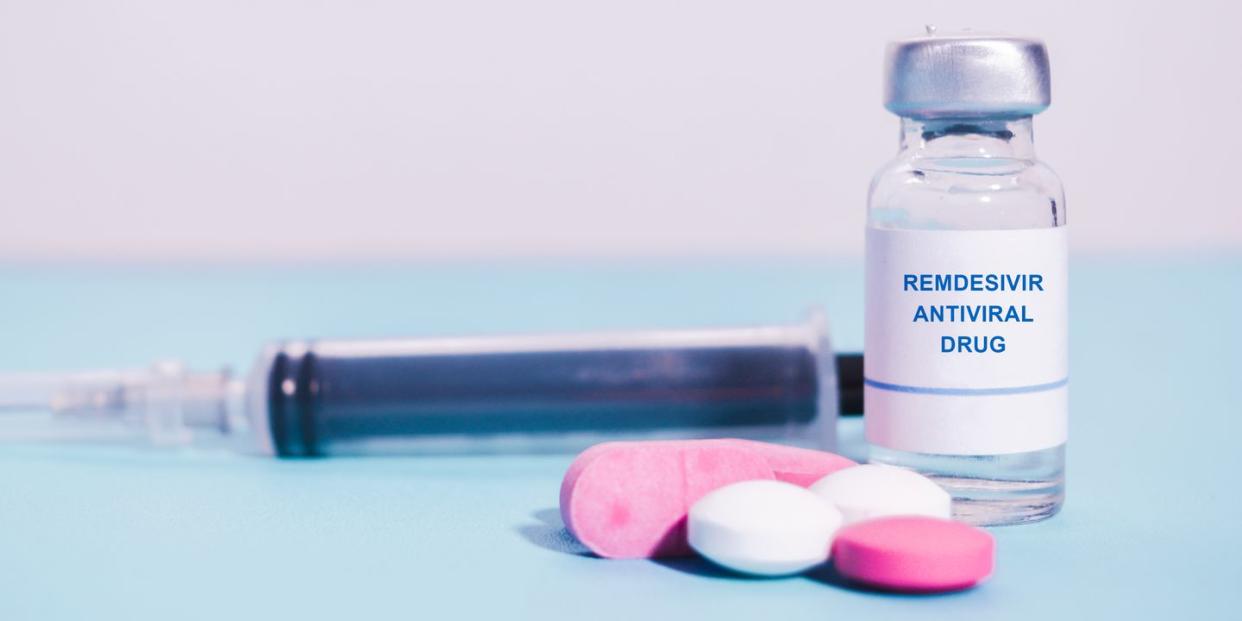Experts Say an Antiviral Drug Shows “Clear-Cut” Promise as a COVID-19 Treatment

The antiviral drug remdesivir has been granted emergency use authorization to treat severely ill COVID-19 patients, the FDA has announced.
Anthony Fauci, M.D., head of the National Institutes of Allergy and Infectious Diseases, says the drug has a promising effect on coronavirus recovery time.
An expert explains how remdesivir works, its potential against the novel coronavirus, and the possible side effects to know.
Earlier this week, public health officials revealed that research has shown a benefit in using the experimental drug remdesivir as a potential COVID-19 treatment. On May 1, The U.S. Food and Drug Administration (FDA) officially granted the drug emergency use authorization to treat severely ill COVID-19 patients, according to a press release.
“The data shows that remdesivir has a clear-cut, significant, positive effect in diminishing the time to recovery,” Anthony Fauci, M.D., head of the National Institutes of Allergy and Infectious Diseases, said in a press conference on Wednesday, per NBC News.
Dr. Fauci referenced a preliminary study of more than 1,000 people, in which COVID-19 patients either received remdesivir or a placebo. In the as-yet-unpublished trial sponsored by the National Institute of Allergy and Infectious Diseases, COVID-19 patients who received a remdesivir treatment had an average course of illness that lasted 11 days, compared to people who were sick for 15 days when they took a placebo (a 31% faster time to recovery).
Dr. Fauci said the results from the trial were promising, and actually provide “an ethical obligation to immediately let the placebo group know so they can have access” to remdesivir. While more research is needed to truly evaluate its efficacy, “what it has proven is that a drug can block this virus,” Dr. Fauci said.
Remdesivir is manufactured by the pharmaceutical company Gilead, which has vowed to quickly increase production. The company specifically stated that it plans to have more than 140,000 treatments courses available by the end of May, 500,000 treatment courses by the end of October, and several million treatment courses in 2021, “if required.”
So how does remdesivir work, and what has it been used for in the past? Here’s what you need to know about the potential COVID-19 treatment.
What is remdesivir and how does it work, exactly?
Remdesivir is a broad spectrum antiviral drug that took 10 years to develop, and it works by interfering with viral replication, says Jamie Alan, Pharm.D., Ph.D., an assistant professor of pharmacology and toxicology at Michigan State University. Remdesivir specifically interferes with viral RNA chains, which the coronavirus uses to replicate itself rapidly, Dr. Alan explains. “If the virus cannot replicate, it cannot survive,” she explains.
Testing remdesivir’s effect on COVID-19 started in January when the outbreak began, Gilead explains. It has since expanded and the drug is now being studied in 70 different countries.
What was remdesivir used for before COVID-19?
Remdesivir has been tested in the past on emerging diseases like Ebola and other coronaviruses, including SARS and MERS, but has never been an official treatment for any one condition. “It was used for Ebola, but it was not effective,” Dr. Alan says. Until the recent FDA announcement, Gilead even stated online that the drug was “not approved anywhere globally for any use.”
How effective is remdesivir against COVID-19?
Similar to how oseltamivir (Tamiflu) shortens the duration of influenza, remdesivir may help speed up the course of illness, Dr. Alan says. Other than that, the two drugs are “pretty different,” she says. A huge difference—on the patient side, at least—lies in how you receive it. Oseltamivir is usually taken orally; Remdesivir is given to patients through a daily infusion for 10 days.
While the new trial yielded encouraging results, the efficacy of remdesivir is still up for discussion. In a different study of 237 hospitalized COVID-19 patients in China that was published in The Lancet, researchers found that remdesivir did not lower death rates from the virus or even make people feel better. “Remdesivir was not associated with statistically significant clinical benefits,” the researchers concluded.
The FDA specifically states that “there is limited information known about the safety and effectiveness of using remdesivir,” but “given there are no adequate, approved, or available alternative treatments, the known and potential benefits to treat this serious or life-threatening virus currently outweigh the known and potential risks of the drug’s use.”
So, does that mean remdesivir has side effects?
Unfortunately, yes. Some people who have taken the drug have experienced side effects like abnormal heart rhythms, low blood cell counts, organ impairment, respiratory failure, and yellow discoloration of skin, Dr. Alan says. Infused-related side effects may include low blood pressure, nausea, vomiting, sweating, and shivering.
That’s why the drug has only been approved for those who are battling a severe case of COVID-19, meaning a patient is need of oxygen therapy or breathing support through a ventilator.
Bottom line: There’s still a lot to learn about remdesivir as a possible COVID-19 treatment.
There have been no peer-reviewed studies on the drug and the trial that Dr. Fauci is excited about hasn’t even been published yet. Ultimately, “it’s debatable whether or not it works,” Dr. Alan says.
No single drug is proven to be 100% safe and effective in treating COVID-19 yet, but in the absence of a cure or vaccine, doctors are trying anything that gives patients a glimmer of hope.
Support from readers like you helps us do our best work. Go here to subscribe to Prevention and get 12 FREE gifts. And sign up for our FREE newsletter here for daily health, nutrition, and fitness advice.
You Might Also Like

